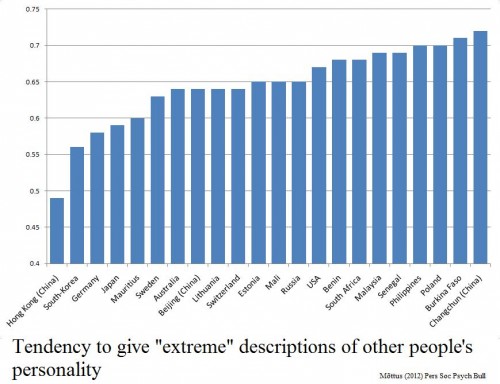Cross-posted at Neuroskeptic.
“Personality differences” between people from different countries may just be a reflection of cultural differences in the use of “extreme” language to describe people.
That’s according to a very important paper just out from an international team led by Estonia’s René Mõttus.
There’s a write up of the study here. In a nutshell, they took 3,000 people from 22 places and asked them to rate the personality of 30 fictional people based on brief descriptions (which were the same, but translated into the local language). Ratings were on a 1 to 5 scale.
It turned out that some populations handed out more of the extreme 1 or 5 responses. Hong Kong, South Korea and Germany tended to give middle of the road 2, 3 and 4 ratings, while Poland, Burkina Faso and people from Changchun in China were much more fond of 1s and 5s.
The characters they were rating were the same in all cases, remember.
Crucially, when the participants rated themselves on the same personality traits, they tended to follow the same pattern. Koreans rated themselves to have more moderate personality traits, compared to Burkinabés who described themselves in stronger tones.
Whether this is a cultural difference or a linguistic one is perhaps debatable; it might be a sign that it is not easy to translate English-language personality words into certain languages without changing how ‘strong’ they sound. However, either way, it’s a serious problem for psychologists interested in cross-cultural studies.
I’ve long suspected that something like this might lie behind the very large differences in reported rates of mental illness across countries. Studies have found that about 3 times as many people in the USA report symptoms of mental illness compared to people in Spain, yet the suicide rate is almost the same, which is odd because mental illness is strongly associated with suicide.
One explanation would be that some cultures are more likely to report ‘higher than normal’ levels of distress, anxiety — a bit like how some make more extreme judgements of personality.
So it would be very interesting to check this by comparing the results of this paper to the international mental illness studies. Unfortunately, the countries sampled don’t overlap enough to do this yet (as far as I can see).
Source: Mõttus R, et al (2012). The Effect of Response Style on Self-Reported Conscientiousness Across 20 Countries. Personality and Social Psychology Bulletin PMID: 22745332
————————
Neuroskeptic blogs anonymously here. You can also follow him on Twitter.


Comments 14
Anna — August 13, 2012
"Whether this is a cultural difference or a linguistic one is perhaps debatable"
Similar to the points raised about nature/nurture debate in that post a few days, it is impossible to disentangle culture and language. Culture is buoyed by language, and every language contains its own culture of thought. I don't view it in terms of debate, as they both inform each other in equal measure.
With regard to suicide, many argue that sociability has a much larger stake in suicide rates than the rates of mental illness (and interestingly, also the level of *decent* political and socio-economic stability). Spanish culture appears to have a climate where individuals are more outgoing and open to sharing their feelings and troubles. It may also encourage strong networks of family and friendship. I've read about this in comparison to a Northern European country (must have been Finland?), which had a more reserved and "stiff upper lip" culture, and placed less emphasis on strong social networking. Even though that country had far less macroscopic hardships than Spain, the suicide rate was much higher.
Then again, it might just be that many suicides in Spain are not reported as such. It may be more of a social or religious taboo than it is in the U.S. Does anyone know know more about this? Is Elena reading this?
decius — August 13, 2012
Were the scales simply 1-5, or were there phrases for each level ("Very happy, somewhat happy, neither happy nor unhappy, somewhat happy, very unhappy" is different from "Extremely happy, happy, neither... ")
Timothy — September 30, 2024
Extremism often challenges the core values of national character, which ideally embodies tolerance, unity, and diversity. When individuals or groups adopt radical views, they can fracture the social fabric, undermining the principles of mutual respect and coexistence. A nation’s strength lies in its ability to embrace differing perspectives while fostering dialogue. With the rise of global connectivity, tools like Globe sim {https://globe-simregistration.com/} can play a role in promoting understanding across cultures. Ultimately, countering extremism requires reinforcing a collective identity that celebrates inclusivity and resilience, ensuring that national character is not defined by division, but by shared humanity.
john harvard west — July 3, 2025
Extremism often shapes perceptions of national character in complex ways. In the same way, being informed matters; knowing how to check SRD status online helps people stay aware of their support. Visit now:https://sassasrd-status.co.za/
john harvard west — July 3, 2025
Extremism often shapes perceptions of national character in complex ways. In the same way, being informed matters; knowing how to check srd status online helps people stay aware of their support.
william — July 15, 2025
Great point! Just like public services need taxes, events need planning; whether it's infrastructure or lunch. Even McDonald catering plays a role in keeping things running smoothly at gatherings!